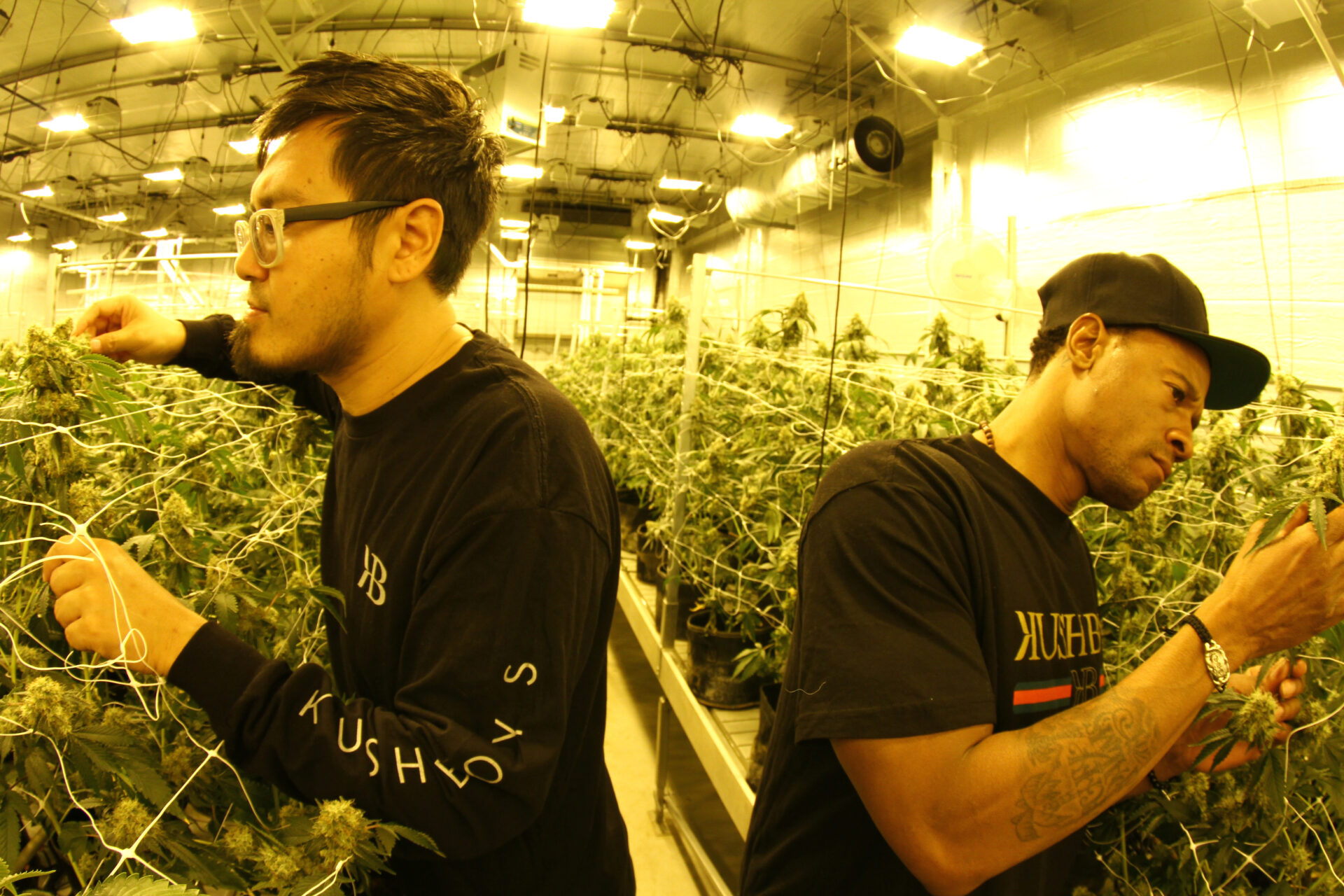When Tahir Johnson worked at Morgan Stanley in 2013, he watched GW Pharmaceuticals, a company with a cannabis derivative drug, go public. Just six months prior, Washington state and Colorado approved recreational use. Cannabis was in the mainstream — more widely accepted.
“That was the first thing that said to me, ‘Man, this is something different than what we have been seeing, what we have been experiencing, what me and my friends have been locked up for.’ I could see where [cannabis] was becoming something different,” says Johnson, who is now the director of social equity and inclusion at the Marijuana Policy Project, and is about to open a dispensary of his own.
In the U.S., cannabis has been illegal on the federal level since 1970. It was specifically targeted in the 1980s, starting with the War on Drugs and later with the Anti-Drug Abuse Act of 1986, which created mandatory minimum sentences of five years for people caught with marijuana or other narcotics.
Attitudes across the country toward cannabis have largely changed since then. Since the first states legalized cannabis for medicinal use in the late 1990s and then for recreational use in 2012, more have followed suit, with 19 states currently allowing for adult recreational use. Thirty-seven states, D.C., Guam, Puerto Rico and U.S. Virgin Islands currently have approved cannabis for medicinal use by qualified people.
As marijuana legalization continues, President Biden has pardoned all federal marijuana possession charges, calling for governors to follow suit, and in the 2022 midterm election in November, two more states voted to legalize it recreationally. Still, the lingering effects of prohibition will take more time to dissipate.
Despite Black and white populations in the U.S. using the plant at similar rates, Black and brown communities have experienced higher rates of incarceration and impact on their families. According to Marijuana Policy Project, half of all drug arrests are for cannabis, and two-thirds of people serving time in state prisons for drug offenses are people of color. After serving time, it becomes significantly more difficult to find a job and vote, creating lasting effects on communities disproportionately affected by the War on Drugs.
The state of diversity in cannabis
Looking back at his time as a financial advisor, Johnson sees diversity, equity and inclusion training as the same across industries — he’s currently taking the corporate training on empowering, educating and creating opportunities and working to apply them to the cannabis industry.
“Cannabis [and the War on Drugs] has harmed Black and Brown communities. There’s the important focus of trying to make sure that as we do legalize, that these groups don’t get left behind,” Johnson says.
This newly legal and regulated industry has drawn widespread attention from businesspeople and has proven a booming industry, earning $24 billion just last year. But representation of those disproportionately affected by the War on Drugs lags. In 2017, just 19 percent of cannabis businesses were minority-owned or have a minority ownership stake, according to a survey from MJBizDaily. “Mind you, we don’t have any piece of it and our people are still getting locked up for it,” Johnson says.
State-level regulatory changes and efforts by cannabis-focused businesses and associations are helping to improve access to the industry. This concept, called social equity, promotes inclusion and justness. When applied to the cannabis industry, social equity aims to support and include prohibition-era legacy operators, minority communities and people who have felt disproportionate effects of the War on Drugs.
Social equity programs are one way to even the playing field, but there’s still room for DEI training in the industry to make an impact.
“Cannabis is a new industry, so if we focus early on in the beginning, we can help make sure that diversity in cannabis doesn’t look like finance or technology,” Johnson says.
Barriers to entry
At Marijuana Policy Project, Johnson focuses on policy and social justice for communities impacted by prohibition. He’s even getting involved in the business side of the industry.
Unfortunately, when he applied for his first cannabis business license in 2019, barriers arose. His past cannabis charges meant his application wasn’t prioritized when he first sought a license. Applying in New Jersey also meant paying a $20,000 application fee ($18,000 was refundable) and having real estate lined up; the building Johnson eyed cost $1.1 million.
Along with the lingering effects of the War on Drugs, access to capital is one of the major forces disproportionately affecting minority business owners. It keeps people of color out of the industry, Johnson says.
Luckily, as of 2021, New Jersey now prioritizes business owners from economically disadvantaged areas, and it prioritizes women-owned, minority-owned and disabled veteran-owned businesses. A Social Equity Excise Fee helps fund education and social support services in impact zones — areas with high unemployment rates or significant cannabis-related arrests. The state also made its application fee more accessible, at $200 up front, and past cannabis-related charges meant Johnson was actually prioritized in the process.
Johnson’s business, Simply Pure Trenton NJ, is opening in late 2022 and has garnered a lot of interest. He is excited to “take something that in our community was once a source of pain that caused so many problems for people, to now be a business opportunity,” he says.
Social equity programming for development
Operating in Colorado, which legalized cannabis for recreational use in 2012, there wasn’t much diversity at the time, says BriAnne Ramsay, CEO of Rocky Mountain Cannabis Consulting. “I think it’s absolutely mind-boggling” that the state just implemented a social equity program in 2020, called Accelerator, she says.
Social equity programming is led by states such as Illinois, Michigan and California. By lowering some barriers to entry, “people who were impacted by the War on Drugs have a seat at the table,” she says.
Ramsay noted New Jersey’s licensing application employment plan requirement, which should highlight efforts to seek out and employ social equity applicants, as well as train them. “I think training plans and getting that education out there is really beneficial,” she says.
While training plans aren’t a required part of the licensing applications, “this is a strategy everyone should implement into their business,” Ramsay says. Specifically, a training plan helps to ensure that legal requirements are covered and that management and leadership have check-ins to be sure they captured all necessary information. Lastly, training should be measurable so that organizations understand how much information from training was retained.
When it comes to addressing DEI in the workplace, Ramsay says that training should be conducted for compliance, operations, HR, state-approved vendor training and OSHA regulations.
At the company and organization level, RMCC itself contributes to social equity and employee development through its internal internships, resume reviews to formerly incarcerated individuals and by providing discounted or complimentary programs to social equity licensees.
RMCC helps clients navigate the regulations in the industry, establishing procedures and training plans, licensing and online certifications around compliance and operations to help cannabis companies grow their businesses. RMCC provides this certification program (a $3,000 value) free to 25 social equity licensees annually, creating a social equity incubator.
“We really try to help them out as much as possible with launching their business,” Ramsay says.
Other groups, like the National Cannabis Industry Association, provide discounts to social equity members, says Mike Lomuto, diversity, equity and inclusion manager at the National Cannabis Industry Association.
NCIA has about 1,000 members and 14 committees, and Lomuto helps run a social equity program with a scholarship of a complimentary year of membership, and year two is also discounted. Lomuto noted that MPP’s Johnson is his role’s predecessor and also created their scholarship program.
The 100 or so social equity members then have access to a number of programs, including a weekly Zoom Power Hour. These calls feature ask-me-anything sessions and announcements, allowing members to promote their businesses, network and connect with resources.
Two NCIA committees for facilities design and human resources also hosted a social equity member on monthly calls, providing them with 45 minutes to solve one of their problems alongside a dozen industry experts. The A social equity member spoke with Lomuto after presenting and said, “If I had known this stuff before, I would have saved a lot of time and money, and now that I’ve done this session with these guys, I know that I’ll save a lot more money moving forward.”
For anyone who is working to create a DEI program, social equity program or training, “the number one question you need to ask yourself is why you’re doing it and who you’re doing it with or for,” Lomuto says. When the “why” is because of good marketing, that’s not deep enough.
“If your why is really about the long term and about creating true impact and you’re looking to work with the folks you’re helping, that’s where the potential lies,” Lomuto says.















